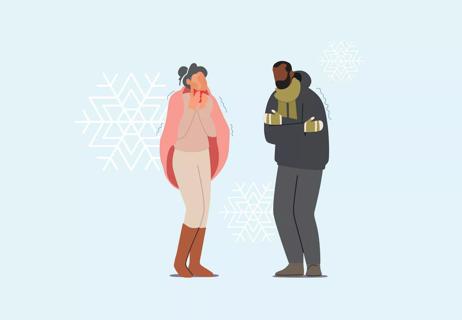Symptoms can overlap and be hard to distinguish, but there are some telltale differences

Cough. Congestion. Headache. Sore throat. They’re common symptoms that can leave you wondering what’s going on and how to get better fast.
Advertisement
Cleveland Clinic is a non-profit academic medical center. Advertising on our site helps support our mission. We do not endorse non-Cleveland Clinic products or services. Policy
Is it COVID-19 or a cold? Or maybe it’s your allergies kicking into high gear?
Should you wait it out? Call a doctor? Take a COVID-19 test?
All legitimate questions. And common ones. Because COVID-19, colds and allergies can sometimes feel similar. But knowing what’s affecting you can make a big difference in how you manage your symptoms and start feeling more like yourself again.
We talked with otolaryngologist Michael Benninger, MD, about the symptoms and treatments for COVID-19 vs. colds vs. allergies so you can get a better idea of what you’re dealing with and get to feeling better sooner.
Below are some of the most common symptoms of COVID-19, colds and allergies in adults. It’s not an exhaustive list of symptoms, and how you experience symptoms of each condition may be different from other people.
For example, COVID-19 doesn’t always come with fever or a loss of taste and smell, though it can. And you may experience nausea when you have a cold or allergies when excess mucus drains to your stomach and causes irritation. But that’s not always the case.
| Symptom | COVID-19 | Cold | Allergies |
|---|---|---|---|
| Runny or stuffy nose | X | X | X |
| Headache | X | X | X |
| Fatigue | X | X | X |
| Sore throat | X | X | X |
| Muscle aches and pains | X | X | |
| Shortness of breath or difficulty breathing | X | X (allergic asthma) | |
| Dry cough | X | X | |
| Fever | X | ||
| Chills | X | ||
| Diarrhea | X | ||
| Nausea or vomiting | X | ||
| Loss of smell and taste | X | ||
| Sneezing | X | X | |
| Wet cough | X | ||
| Itchy or watery eyes | X | ||
| Symptom | |||
| Runny or stuffy nose | |||
| COVID-19 | |||
| X | |||
| Cold | |||
| X | |||
| Allergies | |||
| X | |||
| Headache | |||
| COVID-19 | |||
| X | |||
| Cold | |||
| X | |||
| Allergies | |||
| X | |||
| Fatigue | |||
| COVID-19 | |||
| X | |||
| Cold | |||
| X | |||
| Allergies | |||
| X | |||
| Sore throat | |||
| COVID-19 | |||
| X | |||
| Cold | |||
| X | |||
| Allergies | |||
| X | |||
| Muscle aches and pains | |||
| COVID-19 | |||
| X | |||
| Cold | |||
| X | |||
| Allergies | |||
| Shortness of breath or difficulty breathing | |||
| COVID-19 | |||
| X | |||
| Cold | |||
| Allergies | |||
| X (allergic asthma) | |||
| Dry cough | |||
| COVID-19 | |||
| X | |||
| Cold | |||
| Allergies | |||
| X | |||
| Fever | |||
| COVID-19 | |||
| X | |||
| Cold | |||
| Allergies | |||
| Chills | |||
| COVID-19 | |||
| X | |||
| Cold | |||
| Allergies | |||
| Diarrhea | |||
| COVID-19 | |||
| X | |||
| Cold | |||
| Allergies | |||
| Nausea or vomiting | |||
| COVID-19 | |||
| X | |||
| Cold | |||
| Allergies | |||
| Loss of smell and taste | |||
| COVID-19 | |||
| X | |||
| Cold | |||
| Allergies | |||
| Sneezing | |||
| COVID-19 | |||
| Cold | |||
| X | |||
| Allergies | |||
| X | |||
| Wet cough | |||
| COVID-19 | |||
| Cold | |||
| X | |||
| Allergies | |||
| Itchy or watery eyes | |||
| COVID-19 | |||
| Cold | |||
| Allergies | |||
| X |
What are some ways to tell the difference between COVID-19, colds and allergies? Dr. Benninger shares what to look for.
Colds and COVID-19 are both viral respiratory illnesses. That means they are caused by viruses that affect your airways and lungs.
Advertisement
Both colds and COVID-19 can cause symptoms like:
There are some key differences, though, that can help you know if you’re dealing with COVID-19 vs. a cold.
“For some people, COVID-19 causes fever and chills, though that’s not always the case,” Dr. Benninger notes. “COVID-19 can also cause GI symptoms, like nausea, vomiting and diarrhea that aren’t typical of the common cold or allergies.”
Additionally, one of the hallmarks of COVID-19 is people can lose their senses of smell and taste. That can happen for some people with colds or allergies, but it’s usually only a slight decrease in those senses. A significant loss of taste and smell is much more likely to be a sign of COVID-19.
The best way to know if you’re dealing with a cold or COVID-19 is to take a COVID-19 test.
“Newer, milder strains, COVID-19 can present very similarly to a common cold, so it’s much harder to differentiate without testing,” Dr. Benninger confirms.
If you know you have environmental allergies, like allergies to pet dander, pollen, dust or mold, you’re likely a seasoned pro at spotting the symptoms. The itchy eyes, scratchy throat and congestion probably creep up at relatively predictable times, like spring or fall.
But even if it’s your allergy season, that doesn’t mean you can always blame the sniffles on an abundance of histamine.
Symptoms of allergies and COVID-19 can overlap. So, it’s easy not to know exactly what you’re dealing with.
One key difference is that allergies are more likely to cause itchy, watery eyes, which aren’t typical of COVID-19 or the common cold.
And while difficulty breathing and shortness of breath are common symptoms associated with COVID-19, they can also be signs of asthma that can flare up with the allergy season. If you’re having difficulty breathing but don’t have a fever or belly troubles, allergic asthma, not COVID-19, might be the culprit.
People with allergies and allergic asthma should stay on top of their treatment, advises Dr. Benninger, especially as people with respiratory issues are at a higher risk of potentially severe illness from COVID-19.
“If you can prevent your allergy symptoms from worsening, you’re much more likely to have an easier time managing allergies and avoiding more severe complications if you do get COVID-19,” Dr. Benninger shares.
He recommends starting your allergy medications and routines, like antihistamines and saline rinses, early in the allergy season. That can help keep your allergy symptoms to a minimum and lessen your risk for a complicated case of COVID-19.
Advertisement
So, you’re having cold-like symptoms. But you’ve tested negative for COVID-19. How do you know if it’s allergies or a cold?
One way to tell is to give it a few days.
Colds take a mostly predictable course that lasts about seven to 10 days, Dr. Benninger points out. Your symptoms may start off on the mild side with a tickle in your throat or a runny nose. They then peak about four days in with symptoms like achiness and fatigue. Then, those symptoms start to retreat (sometimes, leaving a nagging cough in its wake).
But allergy symptoms are more likely to stick around for weeks or even months, depending on your exposure to allergens that fire up your immune system. They typically don’t get better or worse over that period of time without treatment.
Another sign that it may be a cold and not allergies is by considering the kind of cough you have. Allergy coughs tend to be dry. And they may cause wheezing — a whistling sound. Colds are more likely to create a wet cough. That is, a cough that brings up mucus.
Healthcare providers recommend vaccination to prevent severe symptoms of COVID-19. Getting vaccinated won’t mean that you can’t get infected, but it can decrease your risk for serious complications.
Advertisement
If you think you have COVID-19 and not a cold or allergies, the only way to know for sure is by taking a COVID-19 test.
If you test positive, talk with your healthcare provider if you’re concerned about your symptoms and seek immediate treatment if you have:
If it’s a cold or allergies you’re dealing with, over-the-counter medications and home remedies can help.
There’s no treatment for a common cold, but pain relievers and decongestants may lessen your symptoms. And those standby home remedies for colds can help, too. Make sure to get plenty of rest, stay hydrated and consider using a humidifier.
If it’s allergies that have you sneezing, medications like antihistamines and decongestants may work. Avoid your allergy triggers when possible and break out the neti pot to remove excessive mucus.
And if you’re not sure what kind of bug or gunk you’re dealing with, don’t hesitate to contact a healthcare provider, like a primary care physician.
“It can be very difficult for people to know if they’re dealing with a cold, flu, allergies, COVID-19, RSV and so many other conditions that affect us,” Dr. Benninger agrees. “Reach out. Your healthcare provider can help you get to the bottom of it and recommend treatments that can get you feeling better faster.”
Advertisement

Sign up for our Health Essentials emails for expert guidance on nutrition, fitness, sleep, skin care and more.
Learn more about our editorial process.
Advertisement

They’re viral cousins, but enteroviruses are more likely to cause serious illness

You can’t cure a cold, but these simple home remedies can help you feel better faster

Don’t expect miracles out of ‘immune-boosting’ supplements when you’re sick

Sinus infections tend to last longer and include symptoms like facial pressure and discolored mucus

Enteroviruses are often to blame for summer colds, leading to a runny nose, sore throat and digestive symptoms

Stress and unhealthy habits can lead to more colds, but taking some precautions may help you stay well

On their own, honey can help soothe a sore throat and garlic has immunity-boosting properties, but you don’t need to go the fermented route

The flu, RSV, COVID-19, pneumonia and more typically circulate during cold weather months

Even small moments of time outdoors can help reduce stress, boost mood and restore a sense of calm

A correct prescription helps your eyes see clearly — but as natural changes occur, you may need stronger or different eyeglasses

Both are medical emergencies, but they are very distinct events with different causes